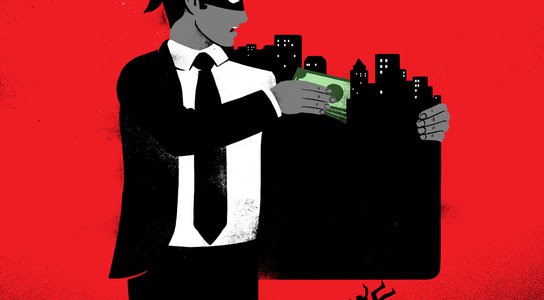It’s pretty exciting seeing an issue that you’ve been going on about for years given a global platform. And that’s what happened to Global Witness last week, when founder Charmian Gooch stepped onto the stage in Vancouver to announce her Wish as a recipient of the $1 million TED prize. ‘My wish is to know who owns and controls companies so they can no longer be used anonymously against the public good. Let’s ignite world opinion, change the law, and together launch a new era of openness in business,’ she said.
Global Witness first started calling publicly for an end to anonymous companies in 2009 in a report I wrote called Undue Diligence: How Banks Do Business with Corrupt Regimes. It had a series of case studies showing, well, banks doing business with corrupt regimes, resulting in poverty and sometimes conflict in their countries. Plenty of these stories included the use of companies whose ownership was hidden. We soon realised that anonymous companies were everywhere that dirty money was being moved: fraud, tax evasion, sanctions busting, secret oil and mining deals, horsemeat masquerading as beef, you name it.

Graphic by @mmjett
Moving dirty money around is not what companies were supposed to be for. As Charmian said in her TED talk, ‘companies were created to limit people’s financial risk, they were never intended to be used as a moral shield.’
It’s a misuse of the basic privilege of incorporation: that you legally separate yourself from the company, so that if your great business idea goes belly up you only lose the investment you made, not the shirt from your back. The ability to incorporate, to protect investments and also creditors, has been a big part of the creation of modern capitalism.
And it remains so. Most companies are still set up to do something: sell a product or a service. There is a location where the work takes place, whether it’s from home, an office, a factory, warehouse or shop, and there is one – or ten, or a hundred, or thousands – of employees. Most companies engaged in genuine business activities know who their real owners are, and it is no burden to them to provide this information. In fact, in lots of countries, information on the directors and shareholder of companies is already made public, and for many ordinary companies, the legal shareholders will also be the real, or ‘beneficial’ owners.
And these ordinary companies will benefit from knowing who, in turn, they are doing business with. An open free market is supposed to operate with equal access to information for all market participants. How is that supposed to happen if some companies keep their real owners secret? Secret ownership of companies doesn’t just allow corruption and crime to happen. It privileges those operating in secrecy over those who don’t, and that doesn’t create a strong entrepreneurial culture. It means, for example, that a big developer can pretend to be lots of different small companies as it buys up a community’s land and puts smaller businesses out of action.
This might be why the head of the UK’s Institute of Directors has welcomed the UK’s plans to develop a central registry of real owners of companies, calling it “a worthwhile exercise, given the damage that faceless corporations can inflict on our economy and society. It also makes sense for the register to be fully in the public domain where it can be subject to some degree of public scrutiny.”
An open register, fully in the public domain, can of course have some tightly defined exemptions for companies where there are legitimate security-related privacy concerns, as long as the information is still available to law enforcement and tax authorities. But as our colleague Diana Ohlbaum at Open Society Foundations recently wrote, ‘Fear of public accountability is not a legitimate excuse for allowing corporations to remain secret.’
Of course, there are those companies with fiendishly complicated cross-border structures in which the legal shareholding and real, beneficial ownership are separated, and in which companies are owned by more and more companies in other countries, like a series of Russian dolls.
At which point there are two possibilities. Either the whole caboodle has a legitimate purpose and genuine business rationale and the lawyer who was paid handsome fees to set it up could explain to the registry who the beneficial owners are. Or it’s being used for fraud, tax evasion, corruption, child trafficking, and other awful things, in which case, the life of the real owners would get a little more difficult.
Which is probably why law enforcement types like the idea of ending anonymous companies too. Jon Adler, National President of the US Federal Law Enforcement Officers Association puts it like this: ‘We must eliminate the corporate fox-holes that criminals cower in, and ensure business accountability and transparency. Requiring corporate filers to disclose who the beneficiaries are isn’t an invasion of privacy; it’s a proclamation of integrity.’
We couldn’t have said it better.
Anthea Lawson is Deputy Campaigns Director at Global Witness.
